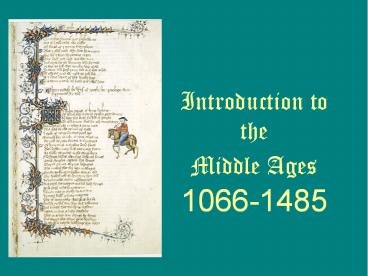Introduction to the Middle Ages 1066-1485 - PowerPoint PPT Presentation
Title:
Introduction to the Middle Ages 1066-1485
Description:
Introduction to the Middle Ages 1066-1485 Medieval Period: 1066-1485 AD Decay of Roman Empire=beginning of Middle Ages Roman empire split into two empires: Western ... – PowerPoint PPT presentation
Number of Views:155
Avg rating:3.0/5.0
Title: Introduction to the Middle Ages 1066-1485
1
Introduction to the Middle Ages 1066-1485
2
Medieval Period 1066-1485 AD
- Decay of Roman Empirebeginning of Middle Ages
- Roman empire split into two empires
- Western ruled from Rome
- Eastern ruled from Constantinople.
- Germanic tribes (Anglo-Saxons) began to invade
and set up individual kingdoms throughout the
Western empire, ending Roman rule. - Introduced the feudal system
3
William the Conqueror
- Invaded from Normandy in 1066
- Changes England through
- A new language (French)
- A new social system (Feudalism)
4
Feudal System
King receives Divine Right from GOD!
5
Knights in Shining Armor
- From mail shirts to a suit of armor
6
Knights in Shining Armor
- Change came about as a result of the crossbow
- Some armor suits weighed upwards of 120 pounds
- Small slits in the helmets limited vision and
ventilation - Heatstroke, suffocation, and
- drowning
- Upside-down turtles
7
Code of Chivalry
- Idealistic code of honor followed by knights
- Values
- Loyalty (to God, King/Lord, and country)
- Brotherhood
- Bravery
- Duty and Honor
- Virtue
- Must follow rules of courtly love when looking
for a wife
8
Courtly Love
- Combination of physical and spiritual desire
- Object of love
- Love is war
- Cupids arrows
- Object as fortress
- Love is a sickness.
9
How to be a Courtly Man
- Be courteous and polite.
- Be mildly flirtatious
- Put your beloved on a pedestal.
- Show emotions through acts of strength and
bravery. - Do not love someone from below your social class.
10
How to be a Courtly Woman
- Remain coy and aloof
- Resist advances
- Follow courtly manners and behavior
- Give tokens of affection
11
Role of Women
- No political rights
- Subservient to men
- Mostly uneducated
- But
- Gained power through courtly love tradition
- Could have power as a merchant, healer, Church
leader (nun), or wife of an important man - Managed estates while husbands were at war
- After marriage, her land became his land
12
Peasants
- Paid taxes (tithes) to church
- Obeyed lord who owned land
- Followed Church leaders in everything
- nasty, brutish, and short lives
13
Population
- Due to rise in commerce, population grew in
cities - Growth in middle class
- More merchants and artisans
- More money for art and education
- Less power for landowners!
14
Christianity
- Many kingdoms adopted the Roman religion,
Christianity (Roman Catholicism). - Adopted the language of the church Latin
- Romance languages descend from Latin and Germanic
dialects.
15
The Power of the Church
- Centers of communities
- Church officials were civic leaders
- Heresy having ideas different from church
doctrine
16
The Crusades1095-1270
- Moors (Muslims) had the Middle East in a
stronghold. - Leaders in Europe felt the need to protect the
Holy Land and keep it under Christian rule.
17
Pope Urbans Speech
- Pope Urban II preached a sermon in France that
inspired European knights to join a crusade to
win back the Holy Lands.
18
The Crusades
- Pros
- Allowed crusaders to bring new spices, textiles
and products back to Europe. - Inspired commerce
- Created new social class merchant class
19
The Crusades
- Cons
- Failed to maintain European rule over the Holy
Land
20
Catholicism vs. Nationalism
- Nationalist feelings began to fuel tension
between various kingdoms and the Catholic church. - Heresy resulted in punishment
21
The Magna Cartasigned in 1215
- Power to (some of) the people
- Heralded a return to older, democratic tendencies
in England - Became the basis of English constitutional law
- Trial by jury
22
The Hundred Years War1337-1453
- England vs. France
- King Edward III and King Henry V try to claim the
French throne - Invention of the long bow
- Green-clad yeoman take the place of knights in
shining armor in battle
23
The Bubonic PLAGUE
- 1348
- Highly contagious spread by fleas from infected
rats - Reduced population of Europe by one-third
- Mostly poorest people
- Caused a labor shortage
- Peasants compete for wages
- Get more money
- Get more power!
- Apocalyptic
24
Literature of the Middle Ages
- Romances
- Adventure stories of kings, knights, damsels
- Quests and battles
25
Literature of the Middle Ages
- Medieval Epics
- Originated in the great halls of the Germanic
tribes and focused on ideas such as loyalty and
valor, which bound societies together. - Defined and expressed character of a people.
26
Literature of the Middle Ages
- Medieval Epics
- Based on historical events but prized adventure
more than accuracy. - Were performed long before they were written down.
27
Literature of the Middle Ages
- Medieval Epics
- Exemplified feudal values
- Title and rank
- Military prowess
- Loyalty
- Honor































